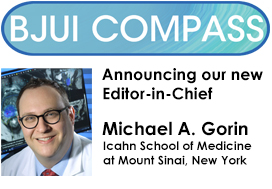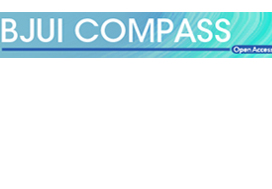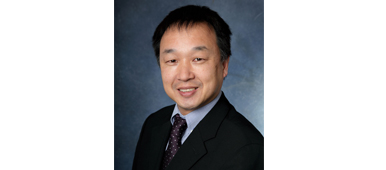BJUI Compass – Announcing the new Editor-in-Chief
BJUI Compass is delighted to announce our new Editor-in-Chief, Michael A. Gorin, M.D.
Michael A Gorin, the new Editor-in-Chief of BJUI Compass
Dr Gorin is an Associate Professor of Urology in the Milton and Carroll Petrie Department of Urology at the Icahn School of Medicine at Mount Sinai. He is an internationally recognized expert on the use of molecular imaging techniques in the diagnosis and management of urologic malignancies. He is also widely recognized for his work developing novel methods for performing MRI-guided transperineal prostate biopsy and focal ablative treatments for prostate cancer. As a fellowship-trained endourologist, Dr. Gorin’s clinical practice primarily focuses on caring for patients with kidney stones, lower urinary tract symptoms, and prostate cancer.
Dr. Gorin has published over 275 articles in peer-reviewed journals with collaborators from around the world. Additionally, he has contributed to multiple medical textbooks, including chapters in Campbell-Walsh-Wein Urology, The 5-Minute Urology Consult, and Gray’s Anatomy. In July 2022, Dr. Gorin was selected as the new Editor-in-Chief of BJUI Compass, the open-access companion journal to the BJU International. Dr. Gorin also serves on the editorial boards of several other journals, including UROLOGY (the Gold Journal), Urologic Oncology: Seminars and Original Investigations, and the World Journal of Urology. Dr. Gorin has received numerous honors and awards for his scholarly work, including the Drs. Carl and Barbara Alving Endowed Award for Outstanding Biomedical Research from the University of Miami Miller School of Medicine and the William F. Rienhoff, Jr., M.D. Scholar Award from Johns Hopkins University School of Medicine.
Dr. Gorin attended college at the University of Michigan, earning a Bachelor of Science in Cellular and Molecular Biology. He then attended medical school at the University of Miami Leonard M. Miller School of Medicine, where he graduated as an inductee to the Alpha Omega Alpha Honor Medical Society. Following medical school, Dr. Gorin completed a general surgery internship, urology residency, and fellowship in endoscopic and minimally invasive urology at the James Buchanan Brady Urological Institute at Johns Hopkins University School of Medicine.
Click here to find out more about BJUI Compass







